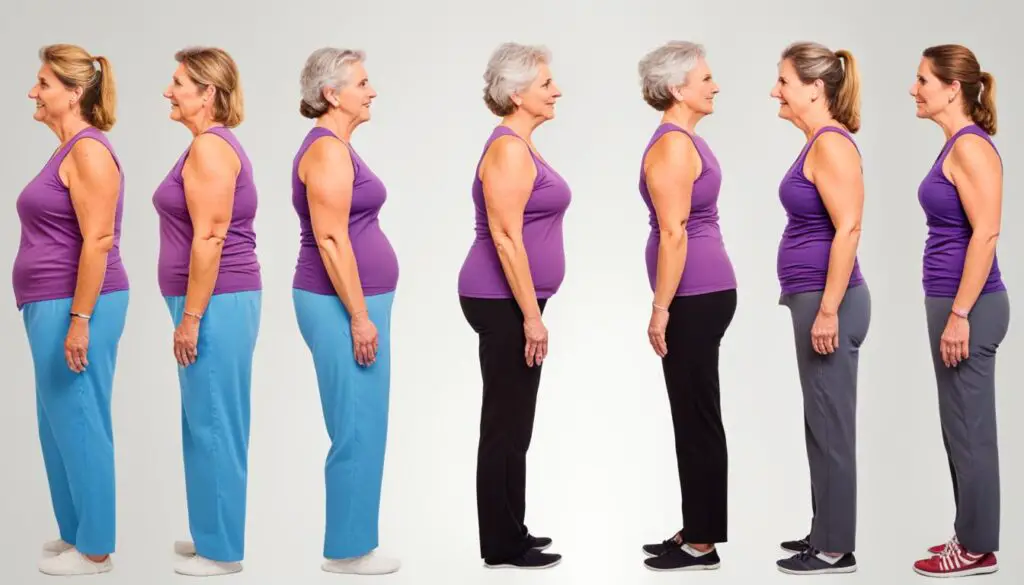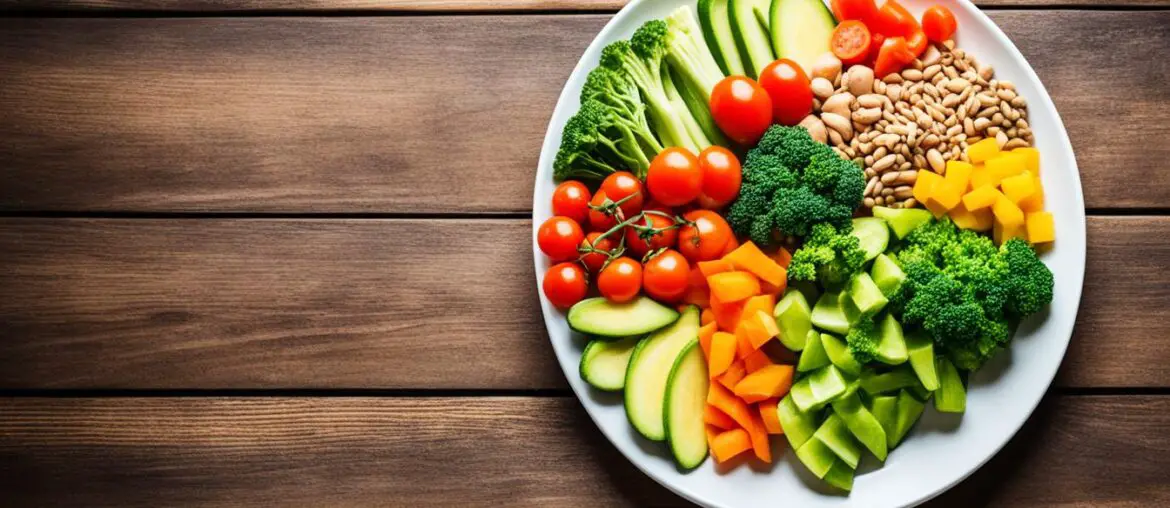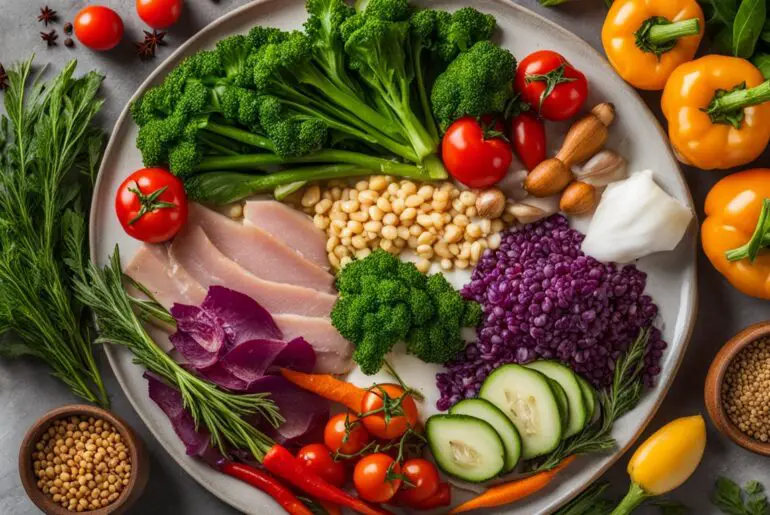Did you know that over 50% of individuals who complete the HCG diet struggle with maintaining their weight after transitioning back to normal eating? Despite the success of the HCG diet in promoting weight loss, many people face challenges when it comes to post-diet weight maintenance. The key to long-term success lies in following a strategic approach that gradually reintroduces food, increases calorie intake, and incorporates regular exercise. In this article, I will guide you through the process of transitioning from the HCG diet to normal eating and provide you with essential tips to maintain your weight and enjoy a sustainable healthy lifestyle.
Key Takeaways:
- Transitioning from the HCG diet to normal eating requires careful planning and lifestyle adjustments.
- Gradually increase your calorie intake to allow your body to adjust without triggering weight gain.
- Reintroduce foods slowly and focus on incorporating low-carb and low-fat options.
- Regular exercise is crucial for maintaining weight after the HCG diet; aim for at least 75 minutes of vigorous exercise or 150 minutes of moderate exercise per week.
- Seek professional guidance and support throughout your HCG diet journey to ensure safety and optimal results.
The Problem with HCG Dieters
HCG dieters often face a common hurdle – weight regain after completing the diet. The combination of HCG injections and calorie restriction during the diet is effective in stimulating weight loss and resetting the metabolism. However, once the HCG injections are stopped, the body can enter a fat-storing mode, leading to weight gain. This poses a challenge for HCG dieters who want to maintain their weight after completing the diet.
The body’s response to the sudden absence of HCG injections can trigger a metabolic shift, causing it to hold onto calories and store excess fat. This weight regain can be frustrating for individuals who have put in the effort to lose weight during the HCG diet phase. To successfully maintain weight after the HCG diet, dieters need to make adjustments to their dietary and lifestyle habits.
It is important for HCG dieters to understand that transitioning from the HCG diet to normal eating requires a thoughtful and strategic approach. Simply reverting to old eating habits can result in weight regain and compromise the progress achieved during the HCG diet phase. By implementing the right strategies, HCG dieters can overcome the challenge of weight maintenance after completing the diet.
The Impact of HCG on Weight Maintenance
The HCG injections used in the diet help to reset the metabolism and promote weight loss. However, once the injections are discontinued, the body’s metabolism can become less efficient in processing and burning calories. This can make it easier for weight to be regained. Additionally, the body may also experience a temporary decrease in muscle mass, further impacting the metabolism and potentially contributing to weight gain.
Without proper dietary and lifestyle adjustments, HCG dieters may struggle to maintain their weight after the diet. It is crucial to understand that weight maintenance is an ongoing process that requires conscious effort even after completing the HCG diet.
To successfully maintain weight after the HCG diet, individuals should implement strategies such as gradual increases in calorie intake, reintroduction of foods in a controlled manner, and the establishment of a regular exercise routine. These measures can help prevent weight regain and promote long-term weight maintenance.
The Importance of Diet and Lifestyle Adjustments
Transitioning from the HCG diet to normal eating requires careful consideration of dietary and lifestyle adjustments. One of the key factors to address is the gradual increase of calorie intake. This approach allows the body to acclimate to the higher calorie levels without triggering excessive fat storage.
Reintroducing foods after the HCG diet should be done slowly and in a controlled manner. Focus on incorporating nutritious options while still maintaining a balance of carbohydrates, proteins, and fats. Avoid excessive consumption of processed foods and prioritize whole, unprocessed foods. Finding a sustainable balance that works for your body and lifestyle is crucial in maintaining weight after the HCG diet.
Alongside dietary adjustments, establishing a regular exercise routine is essential for maintaining weight after the HCG diet. Engaging in both cardiovascular exercises and strength training can help support the body’s metabolism and promote calorie burning. Aim for at least 150 minutes of moderate-intensity exercise or 75 minutes of vigorous exercise per week.
Understand that maintaining weight after the HCG diet requires ongoing commitment and consistency. It may take time for your body’s metabolism to fully stabilize, so be patient and persistent in your efforts. Regular monitoring of your weight and making necessary adjustments to your diet and exercise routine can help you achieve long-term weight maintenance.
| Key Considerations for Weight Maintenance | |
|---|---|
| Gradually increase calorie intake | |
| Reintroduce foods slowly | |
| Focus on balanced nutrition | |
| Incorporate regular exercise | |
| Monitor weight and make adjustments |
Gradual Increase of Calorie Intake
After completing the HCG diet, it is crucial to gradually increase your calorie intake to avoid confusing your body and prevent weight gain. By slowly introducing more calories into your diet, you give your body time to adjust and prevent it from going into fat-storing mode. Here’s how you can do it:
- Start with a 200 kcal Increase: For the first week after the HCG diet, add an extra 200 calories to your daily intake. This small increase allows your body to adapt without overwhelming your metabolism.
- Continued Increment: Gradually continue to increase your calorie intake over several weeks. Aim to add an additional 200 kcal per week until you reach the general optimum amount of 1500 kcal per day.
- Calculating Calorie Intake: To determine your specific daily calorie intake, multiply your weight by 13. For example, if you weigh 130 pounds, you can safely consume 1690 kcal per day without gaining extra weight.
By following this gradual increase in calorie intake, you provide your body with the necessary energy while minimizing the risk of weight regain. It’s important to be patient and allow your body time to adjust to the higher calorie levels without storing excess fat.
Remember, everyone’s calorie needs are different, so it’s important to consult with a healthcare professional or registered dietitian to determine the most appropriate calorie intake for your specific needs.
Bring Back Your Normal Diet Routine

After completing the HCG diet, it’s time to reintroduce foods from your regular diet routine. However, it’s crucial to do this slowly and mindfully to avoid any setbacks or weight gain. Gradually incorporating low-carb and low-fat options into your meals can provide a balanced approach to nutrition. Moderation is key during this phase as well, as it allows you to enjoy a wide variety of foods without overindulging.
During the reintroduction phase, it’s important to monitor your weight and make adjustments if necessary. Remember that it may take up to nine weeks for a complete metabolism reset, so be patient with your body’s adjustment process.
Here are some tips to bring back your normal diet routine:
- Start by incorporating low-carb and low-fat options
- Gradually reintroduce different food groups
- Monitor your weight and make adjustments if necessary
- Focus on moderation and portion control
- Allow your body time to adjust to the changes
By following these tips, you can transition from the HCG diet to your normal diet routine while maintaining a healthy weight and lifestyle.
Sample Daily Menu
| Meal | Food Options |
|---|---|
| Breakfast | Egg omelette with vegetables |
| Lunch | Grilled chicken breast with mixed greens |
| Snack | Greek yogurt with berries |
| Dinner | Salmon with roasted vegetables |
| Snack | Handful of almonds |
This sample daily menu includes a variety of nutritious and low-carb options that can be incorporated into your normal diet routine. Remember to listen to your body’s hunger and fullness cues, and make adjustments as needed.
Formulate an Exercise Routine
Regular exercise plays a vital role in maintaining weight after completing the HCG diet. While strenuous exercise is not recommended during the diet phase, it becomes crucial once the diet is completed, and calorie intake is increased. Incorporating an exercise routine into your post-HCG lifestyle is essential to help you maintain your weight loss results.
Exercise After HCG
After completing the HCG diet, it’s time to amp up your physical activity. Engaging in regular exercise helps prevent weight regain and promotes overall well-being. Aim for at least 75 minutes of vigorous exercise or 150 minutes of moderate exercise per week. This can be achieved through various forms of physical activity, such as cardio, resistance training, or even team sports.
The Importance of a Consistent Exercise Routine
To maintain your weight loss after completing the HCG diet, consistency is key. Incorporate exercise into your daily or weekly routine to ensure lasting results. Establishing a consistent exercise schedule will help you stay on track and make exercise a habit rather than a chore.
I believe that exercise, combined with a balanced diet, is crucial for long-term weight maintenance and overall health.” – Dr. Sarah Johnson
Vigorous Exercise for Weight Maintenance
When formulating your exercise routine, consider the benefits of vigorous exercise. Vigorous exercise helps burn calories and build muscle, promoting weight maintenance and overall fitness. Examples of vigorous exercises include running, cycling, high-intensity interval training, and swimming.
Customize Your Exercise Routine
Everyone’s fitness goals and preferences are different. Customize your exercise routine to suit your needs and personal preferences. If vigorous exercise is not your cup of tea, opt for moderate-intensity exercises like brisk walking, dancing, or hiking. The key is to find activities that you enjoy and that fit seamlessly into your daily routine.
Maintain Weight After HCG with Exercise
Regular exercise is a crucial component of weight maintenance after the HCG diet. By incorporating exercise into your routine, you can burn calories, improve your overall fitness, and prevent weight regain. Remember, consistency is key, so make exercise a priority in your post-HCG lifestyle.
Seek Professional Guidance

When it comes to undergoing the HCG diet, seeking professional guidance is crucial for your success. It is important to choose a clinic that is authorized and specializes in the HCG diet. By opting for a medically supervised HCG program, you can ensure that you receive the highest level of support, expertise, and guidance throughout your journey.
A medically supervised HCG program offers numerous benefits. Firstly, you can rest assured that you are receiving treatment from highly trained medical professionals who have a deep understanding of the HCG diet protocol. These professionals can provide you with personalized guidance tailored to your specific needs and goals.
Additionally, authorized clinics for the HCG diet have the necessary resources and expertise to monitor your progress effectively. They can conduct regular check-ups, track your weight loss, and adjust your treatment plan accordingly. This level of oversight significantly increases your chances of achieving your desired results.
Furthermore, professional guidance extends beyond the duration of the diet. Even after completing the HCG program, the support continues as you transition back to a normal eating routine. The guidance and expertise of professionals can help you navigate this transition seamlessly, ensuring that you maintain your weight and continue to make healthy choices.
By choosing a medically supervised HCG program at an authorized clinic, you are prioritizing your health and well-being. Professionals in these clinics are equipped to address any concerns or questions you may have, providing you with the confidence and reassurance needed for a successful HCG diet experience.
Whether it’s understanding the HCG diet protocol, managing potential side effects, or achieving long-term weight maintenance, professional guidance is invaluable throughout your HCG journey. Make the informed choice to seek the expertise and support of authorized clinics offering medically supervised HCG programs, and embark on your weight loss journey with confidence and peace of mind.
Understanding HCG and Weight Loss
HCG, or Human Chorionic Gonadotropin, has been used for over half a century for weight loss treatment in both men and women. Studies have shown that HCG injections, combined with a low-calorie diet, can lead to significant weight loss.
The exact mechanism of how HCG works is not well understood, but it is believed to make the body’s metabolism more sensitive to fats and oils, allowing for increased weight loss.
| Benefit of HCG for Weight Loss | HCG Treatment for Obesity | HCG Injections | HCG and Metabolism Reset |
|---|---|---|---|
| Aids in weight loss by increasing metabolism | Effective treatment for obesity, especially when combined with a low-calorie diet | Administered via injections under medical supervision | Helps reset the body’s metabolism and make it more sensitive to fats and oils |
| Suppresses appetite and reduces cravings | May be recommended for individuals with a high body mass index (BMI) | Medical professionals closely monitor dosage and progress | Assists in maintaining weight loss even after treatment |
| Targets stubborn areas of fat, such as the abdomen and thighs | Can be part of a comprehensive weight loss program | May require regular injections for the duration of the treatment | Enhances the body’s ability to burn fat during and after the treatment |
Duration of HCG Treatment

The duration of HCG treatment varies depending on an individual’s weight loss goals and needs. For those aiming to lose 15 pounds or less, a 23-day treatment plan is typically recommended. This plan involves daily injections of HCG to support weight loss. After the last injection, there is a three-day period where continued calorie restriction is necessary to stabilize weight and allow the body to adjust.
However, for individuals with a weight loss goal of more than 15 pounds, a longer treatment plan may be required. This extended plan generally involves 40 daily injections of HCG to achieve optimal results. It is important to consult with a physician who specializes in HCG treatment to determine the most appropriate and effective treatment plan for your specific needs.
Consultation and Treatment Plan
When considering HCG treatment for weight loss, it is crucial to seek professional guidance from a healthcare provider or authorized clinic. This ensures that your treatment plan is tailored to your unique needs and circumstances. A healthcare professional will assess your weight loss goals, medical history, and overall health to develop a treatment plan that is safe and effective for you.
During the consultation, your physician will discuss the duration of the treatment and provide detailed instructions on the HCG injections schedule. They will outline the recommended dosage, frequency of injections, and any additional dietary or lifestyle guidelines that may be necessary to support your weight loss journey.
By following the recommended treatment plan and staying committed to the HCG injections schedule, you can increase your chances of achieving your desired weight loss goals. Regular check-ups with your healthcare provider will allow for monitoring of progress and adjustments to the treatment plan if needed.
Conclusion
In conclusion, transitioning from the HCG diet to normal eating requires careful planning and lifestyle adjustments. By gradually increasing calorie intake and reintroducing foods slowly, individuals can prevent weight regain and maintain their weight after completing the HCG diet. Incorporating regular exercise into their routine is also crucial for long-term weight management.
Seeking professional guidance throughout the HCG diet journey is important to ensure a safe and effective experience. Understanding the duration and safety of HCG treatment can help individuals make informed decisions about their weight loss goals.
Overall, by following these key takeaways, individuals can successfully transition from the HCG diet to a balanced and healthy lifestyle. With careful attention to their calorie intake, food choices, exercise routine, and professional guidance, they can achieve long-lasting weight management and enjoy the benefits of their weight loss journey.
FAQ
How can I transition from the HCG diet to normal eating?
To transition from the HCG diet to normal eating, it is important to gradually increase your calorie intake, reintroduce foods slowly, and incorporate regular exercise into your routine.
Why do many HCG dieters struggle with maintaining their weight after completing the diet?
Many HCG dieters struggle with maintaining their weight after completing the diet because the body can assume it is in starvation mode and hold onto calories, leading to weight gain.
How should I increase my calorie intake after the HCG diet?
Start by increasing your calorie intake by 200 kcal per day for the first week and continue to increase until reaching the general optimum amount of 1500 kcal per day. This can be calculated by multiplying your weight by 13.
How should I reintroduce foods after the HCG diet?
Start by incorporating low-carb and low-fat options from your normal diet routine slowly. Keep everything in moderation and monitor your weight during this period, making adjustments if necessary.
What exercise routine should I follow after the HCG diet?
After the HCG diet, regular exercise becomes crucial for maintaining weight. Aim for at least 75 minutes of vigorous exercise or 150 minutes of moderate exercise per week. Cardio and resistance exercises are recommended.
Should I seek professional guidance when undergoing the HCG diet?
Yes, it is important to seek professional guidance when undergoing the HCG diet. Choose a clinic that is authorized to carry out the procedure and offers a medically supervised HCG program.
How does HCG work for weight loss?
The exact mechanism of how HCG works for weight loss is not well understood, but it is believed to make the body’s metabolism more sensitive to fats and oils, allowing for increased weight loss.
How long does HCG treatment last?
The duration of HCG treatment depends on the individual’s weight loss goals. For those needing to lose 15 pounds or less, a 23-day treatment plan with daily injections is recommended. For those needing to lose more than 15 pounds, a longer treatment plan with 40 daily injections may be necessary.




